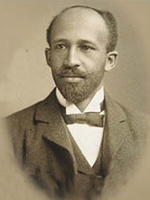W. E. B. Du Bois
Race and Conflict
 One of sociology’s pioneers, who has not received the attention he deserves, is William Edward Burghardt Du Bois (1868-1963). Born to a poor Massachusetts family, Dr. Bois showed extraordinary aptitude as a student. After graduating from high school. he went to college, one of only a handful of the young peopl e in his small town (and the only person of African descent) to do so. After graduating from Fisk University in Nashville, Tennessee, Du Bois realized a childhood ambition and enrolled at Harvard. repeating his junior and senior years and then beginning graduate study. He earned the first doctorate awarded by Harvard to a person of color. Du Bois believed sociologists should direct their effortsto contemporary problems. and for him the vexing issue of race was the paramount social concern. Although he was accepted in the intellectual circles of his day, Du Bois believed that U.S. society consigned African Americans as a whole to an existence separate and apart. Unlike white people. who can make their way in the world simply as “Americans,” Du Bois pointed out, African Americans have a “double consciousness,” reflecting their status as Americans who are never able to escape identification based on color.to serve as a founding member of the National Association for the Advancement of Colored People (NAACP). Du Bois maintained that his research. too, should attempt to address pressing racial problems. Later in his life, Du Bois reflected (1940.51).1 was determined to put science into sociology through a study of the condition of my own group. I was going to study the facts, any and all facts, concerning the American Negro and his s plight.After taking a position at the University of Pennsylvania in Philadelphia. Du Bois set out to conduct the research that produced a sociological classic. The Philadelphia Negro: A Social Study (1899). In this systematic investigation of Philadelphia’s African-American community at the turn of the century, Du Bois chronicled both the strengths and weaknesses of people wrestling with overwhelming social problems. Running against the intellectual current of the times (especially Spencer’s social Darwinism), Du Bois rejected the widespread notion of black inferiority. attributing the problems of African Americans to white prejudice. But his criticism extended also to successful people of color, whom he scolded for being so eager to win white acceptancethat they abandoned all ties with those still in need. “The first impulse of the best, the wisest and the richest,” he lamented, ” is to segregate them selves from the mass” (1899:317). At the time The Philadelphia Negro was published, Du Bois was optimistic about overcoming racial divisions, By the end of his life. however, he had grown bitter, believing that little had changed. At the age of ninety-three, Du Bois left the United States for Ghana. where he died two years later.
One of sociology’s pioneers, who has not received the attention he deserves, is William Edward Burghardt Du Bois (1868-1963). Born to a poor Massachusetts family, Dr. Bois showed extraordinary aptitude as a student. After graduating from high school. he went to college, one of only a handful of the young peopl e in his small town (and the only person of African descent) to do so. After graduating from Fisk University in Nashville, Tennessee, Du Bois realized a childhood ambition and enrolled at Harvard. repeating his junior and senior years and then beginning graduate study. He earned the first doctorate awarded by Harvard to a person of color. Du Bois believed sociologists should direct their effortsto contemporary problems. and for him the vexing issue of race was the paramount social concern. Although he was accepted in the intellectual circles of his day, Du Bois believed that U.S. society consigned African Americans as a whole to an existence separate and apart. Unlike white people. who can make their way in the world simply as “Americans,” Du Bois pointed out, African Americans have a “double consciousness,” reflecting their status as Americans who are never able to escape identification based on color.to serve as a founding member of the National Association for the Advancement of Colored People (NAACP). Du Bois maintained that his research. too, should attempt to address pressing racial problems. Later in his life, Du Bois reflected (1940.51).1 was determined to put science into sociology through a study of the condition of my own group. I was going to study the facts, any and all facts, concerning the American Negro and his s plight.After taking a position at the University of Pennsylvania in Philadelphia. Du Bois set out to conduct the research that produced a sociological classic. The Philadelphia Negro: A Social Study (1899). In this systematic investigation of Philadelphia’s African-American community at the turn of the century, Du Bois chronicled both the strengths and weaknesses of people wrestling with overwhelming social problems. Running against the intellectual current of the times (especially Spencer’s social Darwinism), Du Bois rejected the widespread notion of black inferiority. attributing the problems of African Americans to white prejudice. But his criticism extended also to successful people of color, whom he scolded for being so eager to win white acceptancethat they abandoned all ties with those still in need. “The first impulse of the best, the wisest and the richest,” he lamented, ” is to segregate them selves from the mass” (1899:317). At the time The Philadelphia Negro was published, Du Bois was optimistic about overcoming racial divisions, By the end of his life. however, he had grown bitter, believing that little had changed. At the age of ninety-three, Du Bois left the United States for Ghana. where he died two years later.
Sources: Based. In part. on Baltzell (1%7) and Du Bons (1967: orig. 1899).
